|
International Symposia on River Sedimentation (ISRS) |
INTRODUCTION
The International Symposium on River Sedimentation (ISRS) is a triennial event initiated in 1980 by the Chinese Hydraulic Engineering Society (CHES) with the support of UNESCO. The objective of ISRS is to provide a forum for scientist, engineers, researchers and decision makers to exchange ideas, research results, advanced techniques, and to share their experiences and information on sediment study and management.The International Research and Training Center on Erosion and Sedimentation (IRTCES) in Beijing is the permanent secretariat of ISRS. The WASER was inaugurated at the 9th ISRS in 2004, and the ISRS has been served as the official symposia of WASER since then.
|
ISRS
|
VENUE
|
TIME
|
PARTICIPANTS
|
|
1st ISRS
|
Beijing, China
|
1980.3.24--29
|
230
|
|
2nd ISRS
|
Nanjing, China
|
1983.10.11--16
|
150
|
|
3rd ISRS
|
Jackson, U.S.A
|
1986.3.31--4.4
|
240
|
|
4th ISRS
|
Beijing, China
|
1989.11.1--5
|
285
|
|
5th ISRS
|
Karlsruhe, Germany
|
1992.4.6--10
|
220
|
|
6th ISRS
|
New Delhi, India
|
1995.11.7--11
|
150
|
|
7th ISRS
|
Hong Kong, China
|
1998.12.16--18
|
300
|
|
8th ISRS
|
Cairo ,Egypt
|
2001.11.3--5
|
207
|
|
9th ISRS
|
Yichang, China
|
2004.10.18--21
|
450
|
|
10th ISRS
|
Moscow, Russia
|
2007.8.1--4
|
237
|
|
11th ISRS
|
Stellenbosch, South Africa
|
2010.9.6--9
|
164
|
|
12th ISRS
|
Kyoto, Japan
|
2013.9.2--5
|
380
|
|
13th ISRS
|
Stuttgart, Germany
|
2016.9.19--22
|
300
|
|
14th ISRS
|
Chengdu, China
|
2019.9.16--19
|
458
|
|
15th ISRS
|
Flurence, Italy
|
2023.9.5--8
|
200
|
| 16th ISRS |
Omaha, USA. |
2025.9. |
|
Symposium website of the 15th International Symposium on River Sedimentation (Flurence, Italy, Sep. 6-9, 2022): (https://www.isrs2022.it/)
History of ISRS
The 15th ISRS(Flurence, Italy, 2023)
The 15th International Symposium on River Sedimentation (ISRS) was held in Florence, Italy, from September 5 to 8, 2023, with more than 200 delegates from more than 20 countries and regions around the world. The International Symposium on River Sedimentation is a triennial series of academic activities sponsored by the International Research and Training Center on Erosion and Sedimentation (IRTCES) and the World Association for Sedimentation and Erosion Research (WASER), with the permanent secretariat of the meeting located in IRTCES. The 15th ISRS was jointly organized by the University of Florence and the University of Padua, Italy. The theme of the conference was "Sustainable Sediment Management in a Changing Environment", which included topics such as sediment and pollutant transport; morphodynamics; ecohydraulics; sediment related disaster and climate change; reservoir sedimentation, interactions between sediment and hydraulic structures; sustainable sediment management at the river-coastal basin scale, and social, economic & political issues related to sediment and water management.
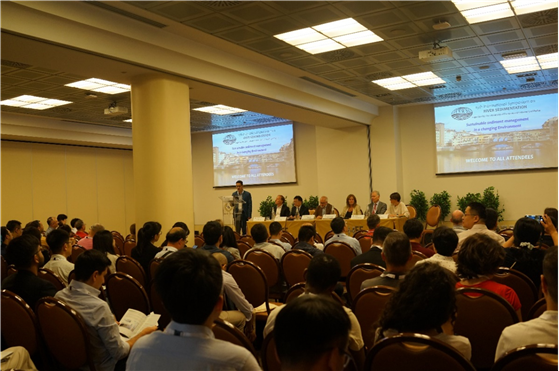
15th International Symposium on River Sedimentation
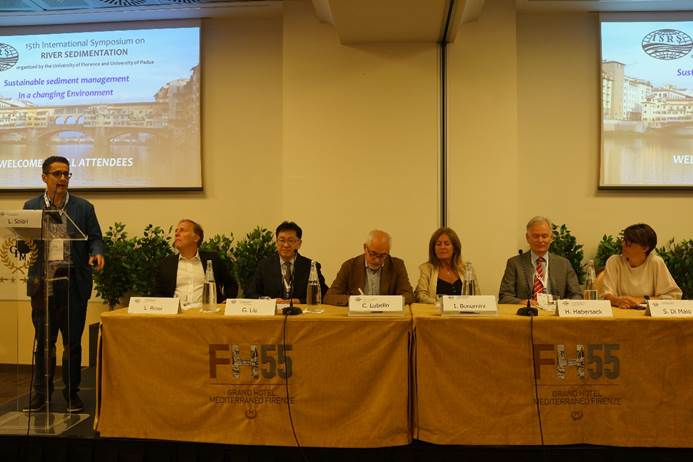
Welcome speeches at the Opening Ceremony
The 15th International Symposium on River Sedimentation was officially opened on September 6 in Florence. Seven welcome speeches were made by Prof. Claudio Lubello, Director of the Department of Civil and Environmental Engineering at the University of Florence, Prof. Luca Solari also from the same department, Prof. Helmut Habersack, University of Natural Resources and Life Sciences, Vienna, President of WASER, Prof. Guangquan Liu, IRTCES professor, Secretary General of WASER, Prof. Isabella Bonamini, Northern Apennines River Basin District Authority, Prof. Sara Di Maio, Italian National Association of Land Reclamation in Tuscany, and Prof. Leonardo Rossi, water management company Publiacqua SpA. They welcomed experts, scholars and young researchers from all over the world to meet, exchange experiences, share knowledge, and jointly promote the progress of research and management practices of river sediment problems in the world under the changing environment. The opening ceremony was chaired by Prof. Luca Solari, Department of Civil and Environmental Engineering, University of Florence.
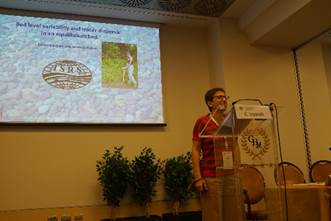 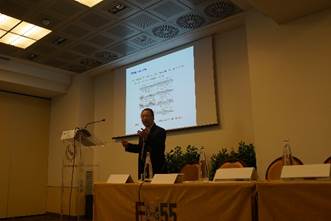
Prof. Enrica Viparelli Prof. Junke Guo
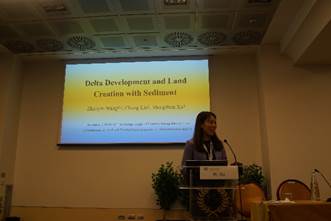 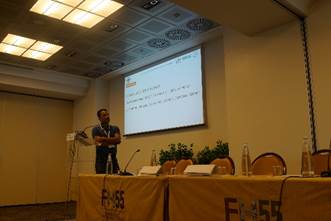
Prof. Mengzhen Xu Research Engineer Alain Recking
Keynote reports at the conference
The conference include 5 keynote reports and more than 120 technical presentations. The conference keynote reports include:
- Prof. Zhaoyin Wang and Prof. Mengzhen Xu (China):Delta development and artificial land creation with sediment;
- Prof. Enrica Viparelli (USA):Role of bed level variability on tracer dispersal in an equilibrium bed;
- Prof. Marcelo H. Garcia (USA):Entrainment, transport and mixing of fine iron mine tailings in the Paraopeba River, Brazil;
- Prof. Junke Guo (USA):Modelling river bedform evolution;
- Research Engineer Alain Recking (France):Accounting natural variability in 1D bedload prediction: a field case study;
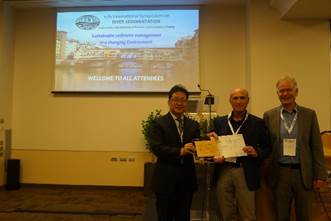 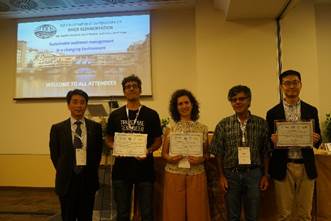
Honorary Member Award and Best Paper Award of IJSR presented
The WASER Honorary Member Award and the Best Paper Award of the International Journal of Sediment Research (IJSR) were presented at the meeting on September 7th. Prof. Giampaolo Di Silvio of Italy, Academician Chunhong Hu and Prof. Zhaoyin Wang of China were awarded as Honorary Member, and three papers published by scholars from China, Saudi Arabia, and New Zealand in IJSR were awarded the Best Paper Award. Prof. Guangquan Liu, Secretary General of WASER, announced that the 16th ISRS will be hosted by the University of Nebraska-Lincoln, in Omaha, USA in 2025. Prof. Guangquan Liu received the flag of the Symposium from Prof. Luca Solari, the representative of the organizing committee, and then handed it over to Prof. Junke Guo, the representative of the next organizer.
A technical visit was organized on September 8th, where delegates visited the Bilancino Lake in the northwest of the city of Florence, the San Niccolò weir on the Arno River in the city center and the new power plant, where they learned about water supply and hydroelectric power generation in the city of Florence, as well as technologies related to sediment management in urban water landscape design, biodiversity conservation and efficient use of water resources.
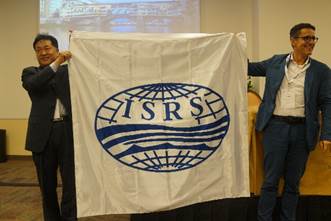 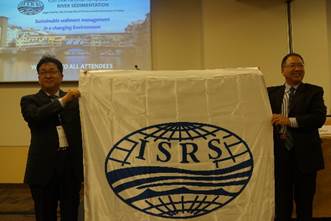
ISRS symposium banner hand over
On the afternoon of September 8th, the 15th ISRS was closed. Prof. Luca Solari, Department of Civil and Environmental Engineering, University of Florence, hosted and summarized the meeting on behalf of the local organizing committee, and Prof. Guangquan Liu, Secretary General of WASER, thanked the University of Florence and the University of Padua for their efforts in making the Symposium a success, and welcomed the delegates to meet again in Omaha, USA, in 2025!
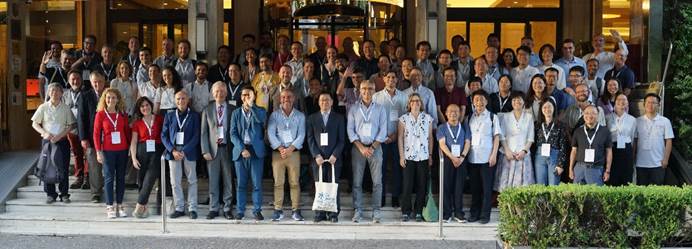
Group photo of the attendees
The 14th ISRS(Chengdu, China, 2019)
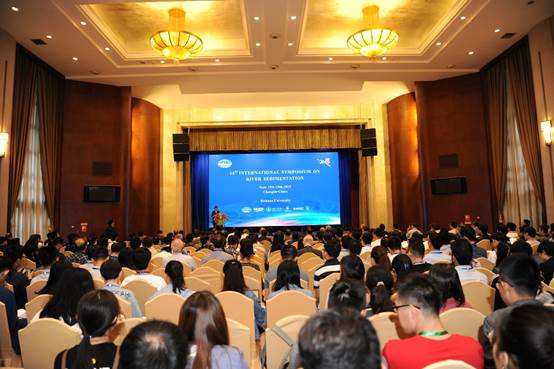
The 14th International Symposium on River Sedimentation (14th ISRS) was held in Chengdu, China from September 16-19, 2019. More than 400 participants from over 25 countries and regions attended the Symposium. The Symposium was organized by Sichuan University, sponsored by the International Research and Training Center on Erosion and Sedimentation (IRTCES) and the World Association for Sedimentation and Erosion Research (WASER), and co-sponsored by International Association for Hydro-Environment Engineering and Research (IAHR), National Inland Waterway Regulation Engineering Research Center, and Changjiang River Scientific Research Institute, etc.
The opening ceremony was held in the morning of September 17 and was chaired by Prof. Pengzhi Lin, Secretary General of the Local Secretariat. Seven welcome speeches were made by Prof. Weilin Xu, Chairperson of the LOC and Deputy President of Sichuan University; Mr. Yun Hu, Director General of Department of Water Resources of Sichuan Province; Prof. Zhaoyin Wang, President of WASER; Prof. Gary Parker, Vice-President of International Scientific Committee; Prof. Marcelo H. Garcia, a representative of the participants; and Mr. Pravin Karki, Global Lead hydropower & Dams at World Bank.
The 14th ISRS main theme was ‘Integrated Sediment Management in Rivers and Coasts’ with the following six main topics:
- Sediment yield and erosion processes;
- Sediment transport;
- Sedimentation in estuarine and coastal areas;
- Reservoir sedimentation;
- Environmental and ecological sediment;
- Fluvial processes and geomorphy;
- Sediment related to disasters;
- Modeling & measurement techniques;
- Integrated sediment management; and
- Fluvial Processes and Regulation in the Yangtze River.
The programme included 10 plenary reports, 14 keynote reports, 150 technical presentations in up to 5 parallel sessions, and 59 poster presentations. The plenary reports were:
-
Global trends in water and sediment fluxes of the world’s large rivers
Prof. Jinren Ni, Peking University, China;
-
Non-linear water and sediment diversions in rivers: a brief history of the Bulle-Effect
Prof. Marcelo H. Garcia, University of Illinois at Urbana-Champaign, USA;
-
Cooperation Platform for Sediment-Related Flash Flood Risk Management
Prof. Xingnian Liu & Prof. Chao Liu, Sichuan University, China;
-
Sediment transport and channel morphology of mountain streams: insights from field observations, flume experiments and modelling
Prof. Marwan A. Hassan, The University of British Columbia, Canada;
-
Mountain River Morphodynamics in Tectonically Active and Earthquake Prone Regions
Prof. Xudong Fu, Tsinghua University, China;
-
Threshold of Particle Movement: A New Paradigm
Prof. Panayiotis Diplas, Lehigh University, USA;
-
Sedimentation Processes in the Selenga River Fluvial-deltaic System: Assessing the Influences of Grain Size and Tectonics on Channel Dynamics
Prof. Jeffrey Nittrouer, Rice University, USA;
-
Quasi-equilibrium and equilibrium in fluvial channel geometry: The presence of multiple stable equilibrium states
Prof. Astrid Blom, Delft University of Technology, the Netherlands;
-
Recent flood disasters caused by river embankment failure in Japan and numerical modelling of embankment failure
Prof. Hajime Nakagawa, Kyoto University, Japan; and
-
Future sedimentation studies
Prof. Zhaoyin Wang, Tsinghua University, China
A half-day technical tours were arranged on the afternoon of September 18. The participants visited the ancient Dujiangyan irrigation project, one of the oldest water projects in the world (2270 years old), which is still working today for flood control and irrigation, due to its success in dealing with problems caused by sediment deposition and scour.
During the Symposium, the Sixth WASER Council Meeting and Assembly were held on September 16 and 19, respectively. The International Workshop on RESCON 2 and Numerical Modeling for Assessment of Sediment Management Alternatives were co-organized by the World Bank, WASER, Sichuan University and UNESCO Office Beijing on September 16.
The closing ceremony was organized on the afternoon of September 19. Prof. Zhao-Yin Wang, the President of WASER, chaired the closing ceremony. Prof. Pengzhi Lin from Sichuan University gave a brief overview for the 14th ISRS. Prof. Guangquan Liu, the representative of the ISRS permanent Secretariat, announced that the 15th ISRS will be held in Florence, Italy in 2022 and will be co-organized by the University of Florence and the University of Padua. Prof. Liu took the symposium banner from Prof. Pengzhi Lin, representative of the 14th ISRS LOC and handed it over to Prof. Luca Solari, representative of the next host Universities. Prof. Solari gave a speech and showed a video to introduce Florence and to invite and welcome all participants to meet again in Florence in 2022 for the 15th ISRS.

Opening Ceremony
 
 
 
 
Welcome speeches at the Opening Ceremony
(Prof. Weilin Xu; Mr. Yun Hu; Prof. Zhaoyin Wang; Prof. Guangquan Liu; Prof. Gary Parker; Prof. Marcelo Garci; Mr. Pravin Karki; Prof. Pengzhi Lin)
 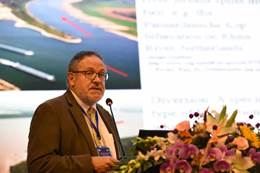
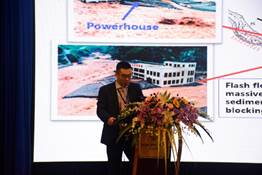 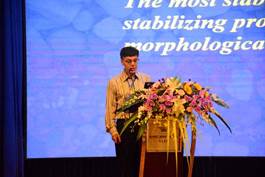
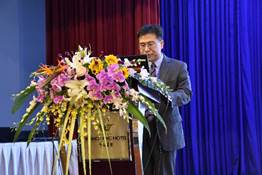 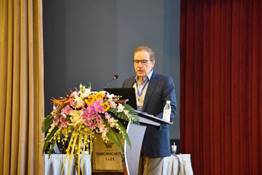
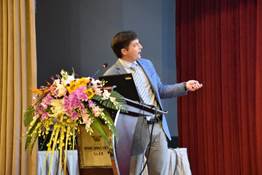 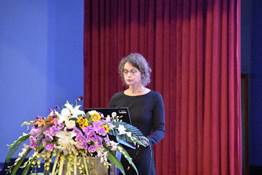
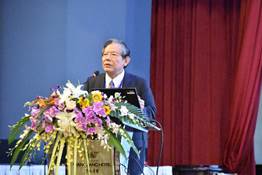 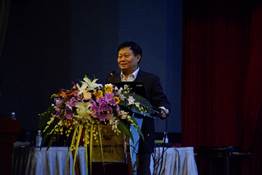
Plenary Reports
(Prof. Jinren Ni; Prof. Marcelo Garcia; Prof. Chao Liu; Prof. Marwan Hassan; Prof. Xudong Fu; Prof. Panayiotis Diplas; Prof. Jeffrey A. Nittrouer; Prof. Astrid Blom; Prof. Hajime Nakagawa; and Prof. Zhaoying Wang)
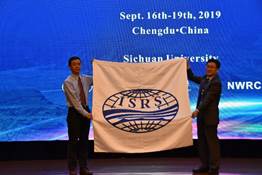 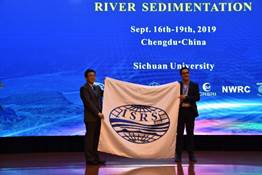
ISRS symposium banner hand over
The 13th ISRS(Stuttgart, Germany, 2016)
The 13th International Symposium on River Sedimentation (ISRS2016) was held at the University of Stuttgart, Germany from September 19-22, 2016. About 300 participants from over 51 countries and regions attended the Symposium. The Symposium was organized by the University of Stuttgart, sponsored by the International Research and Training Center on Erosion and Sedimentation (IRTCES) and the World Association for Sedimentation and Erosion Research (WASER), and co-sponsored by UNESCO, UNESCO-IHP-ISI, IAHR, etc.
The opening ceremony was held in the morning of September 19 and was chaired by Prof. Silke Wieprecht, the Chairperson of the Local Organizing Committee. Six welcome speeches were made between musical frameworks provided by the Academic String Quartet of the University:
l Welcome message from the ISRS 2016 Chair Prof. Dr.-Ing. Silke Wieprecht (Professor of the Institute of Modelling Hydraulic and Environmental Systems, University of Stuttgart);
l Welcome message from the Rector of the Host University Prof. Dr.-Ing. Wolfram Ressel (Rector of the University of Stuttgart);
l Welcome message from the Ministry of the Environment, Climate Protection and the Energy Sector Baden-Württemberg Mdgt Dr. Peter Fuhrmann (Head of Department Water and Soil);
l Welcome message from the City of Stuttgart Dr. Hans-Wolf Zirkwitz (Head of Environmental Protection Agency of the state of Baden-Württemberg);
l Welcome message from the President of WASER Prof. Giampaolo Di Silvio (Professor of the University of Padua, Italy);
l Welcome message from IRTCES by Prof. Guangquan Liu (IRTCES Deputy Director and WASER Secretary General).
The ISRS2016 main theme was ‘Sediment on the Move - Innovative Management Strategies in Riverine Systems: From Old Problems to New Solutions’ with the following six main topics:
A. Integrated Sediment Management at the River Basin Scale
B. Sediment Transport
C. River Morphodynamics
D. Hydromorphology meets Ecology
E. Reservoir Sustainability
F. Social, Economic and Political Aspects of Sediment Management
The programme also included a WISA workshop (Workshop on International Sediment Advancements) and five special sessions including:
SS 1 Hydropower and Sediment Management
SS 2 Navigation and River Morphology
SS 3 Innovative Measurement Techniques
SS 4 Sediment Transport in Fluvial, Estuarine and Coastal Environment
SS 5 Sustainable Land Management
The programme included three keynote presentations, six presentations in WISA including a panel discussion, 183 technical presentations in up to 5 parallel sessions, and 39 poster presentations. The keynote lectures were:
l Advances and challenges in mixed cohesive/noncohesive sediment transport research by Prof. Weiming Wu, Clarkson University, Potsdam, N.Y. (USA);
l Form, function and physics: The ecology of biogenic stabilization by Prof. David M. Paterson, University of St Andrews, St Andrews (UK);
l Local scour at hydraulic structures by Prof. Bruce W. Melville, The University of Auckland, Auckland (NZ).
Two one-day technical tours and two local tours were arranged on September 21. One technical tour included a visit to the Iffezheim barrage, a hydropower station with one of the largest fish passages in Europe, where participants were also able to ride on a hopper barge to see the artificial sediment feeding. The second tour involved a visit to the Schluchseewerk AG and its Pumped Storage Power system, including the upper reservoir, the cavern powerhouse and the outlet into the river Rhine. The two local tours also involved a visit to the hydraulic laboratory of the Institute for Modelling Hydraulic and Environmental Systems, University of Stuttgart.
The Symposium Proceedings were published by CRC Press/Balkema (Taylor & Francis Group) and contained the keynote papers and one-page abstracts of 185 technical papers. Full copies of the technical papers were provided on a flash disk included with the volume.
The closing ceremony was organized on the afternoon of September 22. Prof. Zhao-Yin Wang, the new President of WASER, gave a brief overview and made recommendations for the ISRS 2016. Prof. Guangquan Liu, the representative of the ISRS permanent Secretariat, announced that the 14th ISRS will be held in Chengdu, China in 2019 and will be organized by Sichuan University. Prof. Liu took the symposium banner from Prof. Silke Wieprecht, representative of the ISRS 2016 LOC and handed it over to Prof. Pengzhi Lin, representative of the next host University. Prof. Lin gave a speech and showed a video to introduce Chengdu and to invite and welcome all participants to meet again in Chengdu in 2019 for the 14th ISRS. The symposium was rounded off with a symposium dinner at the grand pump room at Bad Canstatt during the same evening.
 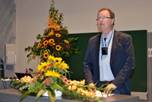
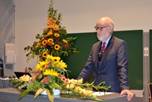 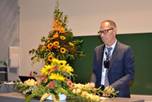
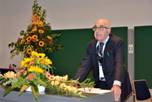 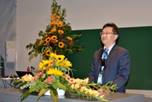
Welcome speeches at the Opening Ceremony
(Prof. Silke Wieprecht; Prof. Wolfram Ressel; Mdgt. Peter Fuhrmann; Dr. Hans-Wolf Zirkwitz; Prof. Giampaolo Di Silvio, and Prof. Guangquan Liu )
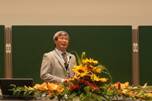 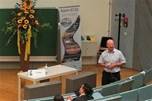
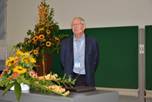 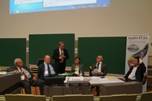
Keynote Presentations (Dr. Weiming Wu, Prof. David M. Paterson and Prof. Bruce W. Melville) and WISA plenary discussion
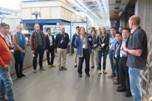 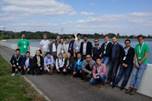
Laboratory visit as part of the local tours and group picture from the technical tour to the HPP Schluchsee
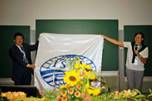 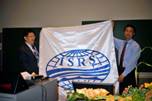
ISRS symposium banner hand over
The 12th ISRS(Kyoto, Japan, 2013)
The 12th International Symposium on River Sedimentation (ISRS2013) was held in Kyoto TERRSA, Japan on Sep. 2 – 5, 2013, more than 370 registered participants from over 30 countries and regions attended the Symposium. The Symposium was organized by the Kyoto University, sponsored by the International Research and Training Center on Erosion and Sedimentation (IRTCES) and World Association of Sedimentation and Erosion Research (WASER), and co-sponsored by UNESCO, UNESCO-IHP-ISI, IAHR, Japan Society of Civil Engineers, Japan Society of Erosion Control Engineering, Japan Society for Natural Disaster Science, Japan Society of Dam Engineers, etc. The main theme is ‘Integrated Sediment Management for River Basin Sustainability: Challenges & Prospects towards Mid-21st Century’ with following topics:
1. Integrated sediment management in river basin scale
2. Sediment yield
3. Sediment transport & morphology in rivers & lakes
4. Local scour & erosion
5. Reservoir sedimentation and management
6. Sediment issues in estuarine & coastal area
7. Environmental & ecological aspects of sediment management
8. Modeling & measurement techniques
9. Sediment related disasters
10. Social, economic & political problems related to sediment management.
The opening ceremony was held in the Terrsa Hall on September 1 chaired by Prof. Hajime Nakagawa, the Symposium Secretary General. The Symposium Chair Prof. Shoji Fukuoka, President of WASER Prof. Giampaolo Di Silvio, IRTCES Deputy Director and Secretary General Prof. Hu Chunhong, Vice-Governor of Kyoto Prefecture Mr. Akamasa Yamashita (on behalf of the Governor Mr. Yamada Keiji), Former Vice President of Kyoto University Prof. Yuzo Ohnishi, and Director-General of Kinki Regional Development Bureau, Ministry of Land, Infrastructure, Transport and Tourism, Japan Mr. Koji Ikeuchi, made welcome speeches.
Two Keynote presentations, a Workshop on the International Sediment Advancements (WISA), over 200 technical presentations in 5 parallel sessions, and over 70 poster presentations were delivered. Keynote lectures are:
Tamotsu Takahashi (Professor Emeritus of Kyoto University): A reverse flow system for the sediment flushing from large reservoirs
Li Yitian (Professor of Wuhan University): Mechanism and prediction of bank failure
Invited lectures are:
D.E. Walling (UK): Sediment source: a key parameter of catchment sediment yield
T. Tsujimoto, K. Moriyasu & T. Sugita (Japan): Integrated sediment management along a river - lessons in the Yahagi River, Central Japan
S. S. Wang, Y. Jia, M. Altinakar & T. Zhu (USA): River sedimentation research by integrated modeling
The WISA was organized in the Terrsa Hall on the morning of September 2. Prof. Giampaolo Di Silvio, Prof. Rollin H. Hotchkiss and Prof. Mike Stone made short reports on the activities and advancements in sediment research by representative associations, WASER, IAHR and IAHS. In the second part of WISA “the international cooperation on sediment research”, first Prof. Manfred Spreafico presented the International Sediment Initiative (ISI) of UNESCO, followed by panel discussions “Impact of dams and sediment management”. Presentations were made and discussed:
Rollin H. Hotchkiss (IAHR): Sustainable dams and creative financing
Mike Stone (IAHS): Reservoir sedimentation and water supply
Hajime Nakagawa (LOC): Catastrophic events and reservoir sedimentation
Giampaolo Di Silvio (WASER): Grain-size segregation in reservoirs and sediment management
Gerrit Basson (ICOLD): Morphological impact of dams on rivers
A technical tour were arranged on September 4 for visiting Ujigawa Open Laboratory (Kyoto University), Amagase Dam, Aqua Biwa, Seta River Weir and Lake Biwa Cruise.
A Symposium Proceedings were published by CRC Press/Balkema(Taylor & Francis Group) containing 2 keynote and 274 technical papers, with abstract version in publication and full paper version in CD-Rom.
Photos of the 12th ISRS: http://www.irtces.org/isi/photo/ISRS2013/
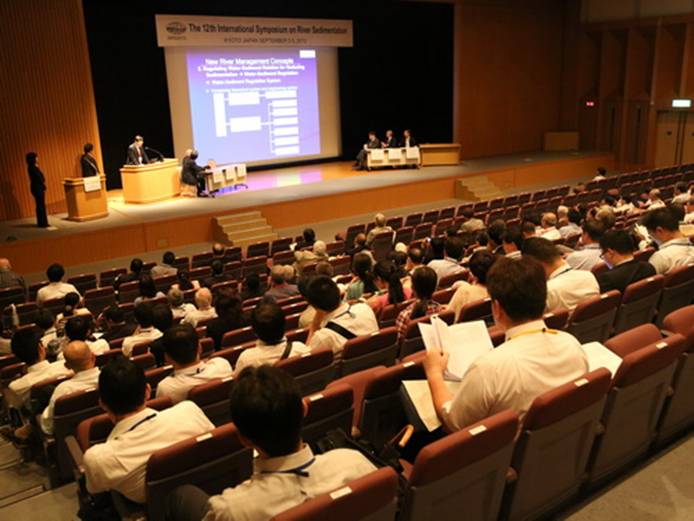
The 11th ISRS (Stellenbosch, South Africa, 2010)
The 11th International Symposium on River Sedimentation (11th ISRS) was held on Stellenbosch University, South Africa on Sep. 6 – 9, 2010, more than 160 registered participants from over 30 countries and regions attended the Symposium. The Symposium was organized by the Stellenbosch University, sponsored by the International Research and Training Center on Erosion and Sedimentation (IRTCES) and World Association of Sedimentation and Erosion Research (WASER), and co-sponsored by UNESCO, ICOLD, IAHR, IAHS and South Africa Water Research Commission. The main theme is ‘Sedimentation and Sustainable Use of River Systems’ with following topics:
l Hydraulics and environmental aspects of river sediment transport processes (fundamental & modelling)
l Fluvial morphological and environmental impacts of hydraulic structures on the downstream river and possible mitigation measures
l Impacts of river sedimentation on hydraulic structures (diversion, abstraction works, bridges, etc.)
l Reservoir/lake sedimentation modelling and management
l Sediment yield, soil erosion determination, modelling and management
l River mouths/estuary sediment dynamics and coastal erosion
l Sediment data collection in rivers, reservoirs and lakes
l Dam break analysis and sediment transport
l Reservoir sedimentation & Management such as flushing or dredging
l Sustainable Tailings Dams
l Sediment quality and management
l Stormwater erosion prevention & litter management
l Sewer sediment transport
l Unlined dam spillway scour
l Climate change impacts on sediment yields, river and estuary morphology
l Bushfire impacts on soil erosion
The opening ceremony was held in the Endler Hall of the Conservatorium on September 6. Chaired by Prof. Gerrit Basson, Prof Arnold van Zyl, Vice Rector of the University of Stellenbosch, Mr. Wandile Nomquphu, South Africa Water Research Commission, and Prof. Des Walling, President WASER, made welcome speeches. Prof. HU Chunhong, Secretary-General of IRTCES, and Mr. Peter van Niekerk, Department of Water Affairs South Africa, made keynote presentations.
Five Keynote presentations and over 120 technical presentations were delivered in the plenary and parallel sessions, respectively, with 7 topics of Fundamental aspects of sediment transport, Sediment yield, Hydraulic structure downstream impacts, Hydraulic structures, River sedimentation, and Reservoir Sedimentation. Keynote presentations are:
l Dr Kim Wium Olesen: Mega deltas and the climate change challenges
l Prof Manfred Spreafico: Sediment data collection in rivers, reservoirs and lakes
l Prof. Weiming Wu: An introduction to latest developments in soil erosion and sediment transport modeling
l MJM R?mkens: Current Erosion and Sediment Research Concerns in Agricultural Watersheds in the USA
l Prof. Zhaoyin Wang: New researches in erosion and fluvial processes
A technical tour were arranged on September 8 for visiting Berg River Dam and Supplement Scheme, Rockfall Hazard Assessment and Mitigation at Chapmans Peak, and the Cape Peninsula.
A Symposium Proceedings were published by Sun Media(Pty) containing 5 keynote and 129 technical papers, with abstract version in publication and full paper version in CD-Rom.
11th ISRS special report: http://www.irtces.org/zt/11isrs/
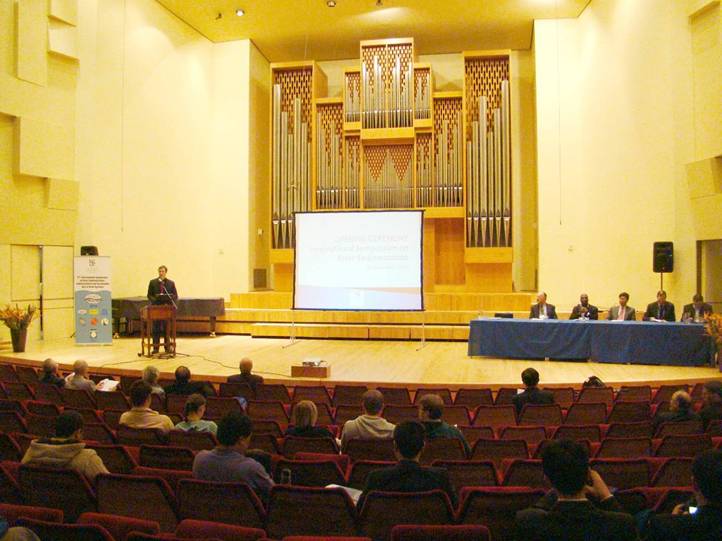
The 10th ISRS (Moscow, Russia, 2007)
The 10th International Symposium on River Sedimentation (10th ISRS) was successfully held in the M.V. Lomonosov Moscow State University, Moscow, Russia on August 1 to 4, 2007. 237 participants from 30 countries and regions attended the important series technical event.
The 10th ISRS was organized by the Moscow State University, sponsored or cosponsored by 18 institutes or organizations including the UNESCO, Federal Agency of Water Resources of Russian Federation Ministry of Natural Resources, Federal Agency of Science and Innovations, World Association for Sedimentation and Erosion Research (WASER) and International Research and Training Center on Erosion and Sedimentation (IRTCES). The central theme of the Symposium is: Effects of River Sediment and Channel Processes on Social, Economical, and Environmental Safety. The problems of soil erosion and fluvial processes, sediment yield forming and sediment transport are the part of general problem of water and earth resources rational usage and protection. The Symposium is to consider sediment transport and accumulation, riverbed processes and river sedimentation, river mouth and estuarine problems, environmental sedimentation, soil and water, and sediment information, pollutant transfer and piling up in rivers and reservoirs, small rivers degradation and disappearance, river engineering, river structures reliability and stability.
The papers were presented and discussed in plenary sessions and 7 parallel sessions, which including: (1) Processes within drainage basins as sources of river sediment: study, modeling, and forecasting under natural and anthropogenic conditions; (2) An estimation of natural and anthropogenic factors contribution into changes of river sediment yield; (3) River sediment yield estimation for studying and modeling river channel processes; (4) Sediment yield in river mouths; (5) River sediment in the environment; (6) Management of river sediment formation and transport processes; and (7) Land-Sea Interactions: Coastal Environmental Changes. 15 keynote papers are:
2 D. E.WALLING (UK) Global Change and the Sediment Loads of the World’s Rivers
2 N.I.ALEKSEEVSKIY, R.S.CHALOV (Russia) Hydroecological Safety of Russia and its Relationship with Sediment Yield and River Channel Deformations
2 N.S.KASIMOV, M.YU.LYCHAGIN, I.A.KOROLEV (Russia) Heavy Metal Transport in the Volga River
2 Presentation by Dr. Abdulmalek A Al Sheikh, secretary general of the Prince Sultan Bin Abdulaziz International Prize For Water
2 SAM S.Y. WANG (USA) River Engineering Using Integrated Methodology
2 P.WALLBRINK (Australia) Progress and Limitations in Modeling Sediment Transport
2 P. DEDKOV, V.I. MOZZHERIN, A. V. GUSAROV (Russia) Suspended Sediment Yield on the Earth: Basic Regularities
2 V.N. Mikhailov (Russia) Hydrological-morphological Processes at River Mouths
2 J.R. Gray, W.R. Osterkamp (USA)Vision for a WorldWide Fluvial-Sediment Information Network
2 B.F. Snishchenko (Russia) Application of the Hydro-Morphological Theory of Channel Processes for Accident Prevention in Social and Industrial Complexes in River Valleys
2 V. N. GOLOSOV (Russia) Research of Sediment Transport and Deposition in the Watershed-River System on the Base of Tracer Techniques
2 BABINSKI (Poland) Influence of Reservoirs on Sediment Transport and Erosion Processes below the Dams
2 Yitian. LI, L. JIANG, Z. SUN (China) Characteristics of Channel Evolution Downstream from the Three Gorges Project
2 Ph. N. Owens (Canada) Erosion Processes and Pollution Transport
2 I.P. KOVALCHUK (Ukraine) Problems of Small Rivers Degradation
A technical tour cruising down the Moskva River from Novospassky Bridge to Serebryany Bor was organized. During the tour, participants looked at hydraulic structures, embankments and bridges, observed the waterways management and visited one of the Moskva-Volga channel locks, as well as enjoyed the beautiful scenery around the river.
The symposium proceedings with 6 volumes was published by the Moscow State University. A total of 374 scientific papers from 38 countries and regions were included into the proceedings.
Details about the symposium can be seen by visiting: http://www.irtces.org/zt/10isrs
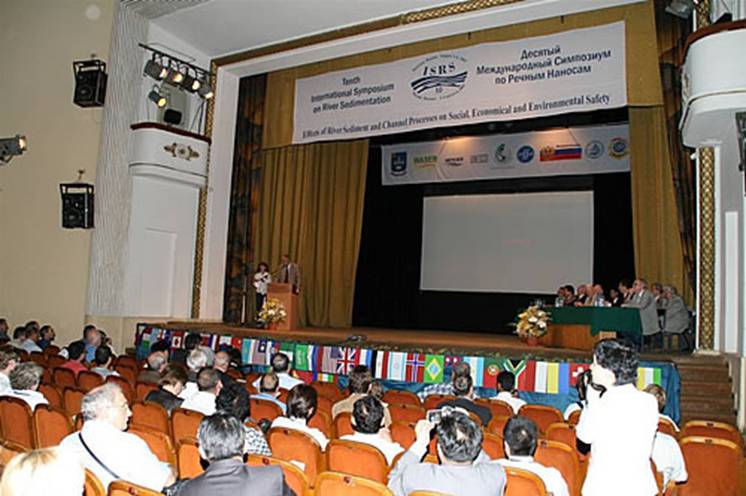
The 9th ISRS (Yichang, China, 2004)
The Ninth International Symposium on River Sedimentation (9th ISRS) has been successfully held on Oct. 18 to 21, 2004 at the site of the partially completed Three Gorges Project on the Yangtze River near Yichang of Hubei Province, China. The Symposium is organized by the Ministry of Water Resources, People’s Republic of China (MWR), sponsored by International Research and Training Center on Erosion and Sedimentation (IRTCES), Changjiang River Water Resources Commission (CWRC), China Institute of Water Resources and Hydropower Research (IWHR) and Chinese Hydraulic Engineering Society (CHES). Twenty nine organizations including the United Nations Educational, Scientific and Cultural Organization (UNESCO), International Association of Hydraulic Engineering and Research (IAHR), International Association for Hydrological Sciences (IAHS) and National Natural Science Foundation of China (NSFC) are co-sponsors.
A total of 450 scientists, engineers, researchers and decision makers from 40 countries, including officials from international organizations, government Departments and other organizations attended the important technical event. Mr. Shucheng WANG, Minister of the MWR, Lisheng SUO, Vice Minister of the MWR, Dr. A. Szollosi Nagy, Deputy Assistant Director General of the UNESCO, Dr. Christopher George, Executive Director of the IAHR, Prof. Kuniyoshi Takeuchi, President of the IAHS and Prof. Desmond E. Walling, newly elected President of the World Association for Sedimentation and Erosion Research (WASER) and other VIPs attended the Symposium and made opening addresses.
The theme of the 9th ISRS is “interactions between fluvial systems and hydraulic projects and pertinent environment impacts”. Under this central theme, six topics are suggested for in-depth discussion, namely large-scaled hydraulic projects and their impacts, river sedimentation, estuarine and coastal engineering, environmental problems in sedimentation, Soil and water and Sediment information. Twelve Keynote lectures were presented in the Plenary Sessions, they are:
· Lisheng SUO: River Management and Eco-Environment Construction in China
· Kuniyoshi TAKEUCHI: Importance of Sediment Research in Global Water System Science
· Sam S.Y. WANG: River Sedimentation and Morphology Modeling
· Guoying LI: Keeping the Yellow River Healthy
· Leo C VAN RIJN: Estuarine and Coastal Sedimentation Problems
· Zhen LIU: Soil and Water Conservation in China
· K.G. RANGA RAJU: SEDIMENT MANAGEMENT IN HYDROELECTRIC PROJECTS
· Des E. WALLING: Using Environmental Radionuclides to Trace Sediment Mobilisation and Delivery in River Basins as an Aid to Catchment Management
· Zhaoyin WANG: Interactions Between Fluvial Systems and Large Scale Hydro-Projects
· Ren ZHANG: Sediment Research for the Three Gorges Project on the Yangtze River since 1993
· Sven HARTMANN: Sediment Management of Alpine Reservoirs Considering Ecological and Economical Aspects
· Jinyou LU: Progress of Sedimentation Research for the Yangtze River
About 200 papers were presented in the Parallel Sessions, among which three special sessions were organized, namely, sediment problems in hydraulic engineering, observation and measuring technique of river sedimentation, and simulation technique on river sedimentation. There were also several poster paper presentations. The lectures, presentations and discussions covered a very wide range of objectives related to river sedimentation, such as hydroprojects and their impacts on fluvial processes and ecological system in rivers, flood control and river training, reservoir sedimentation and its management, headworks and desilting chambers, harbours and waterways, bridge and bed scour, sediment abrasion and energy dissipation, estuarine and coastal processes, debris flows and landslides, sediment biochemical processes and sediment quality, surface erosion and sediment yield, erosion control and watershed management, GIS and RS application, climate change and its impact, hydraulics and fluvial dynamics, physical and mathematical modeling, erosion and sediment measurement, and modern information technique, etc. A rich mixture of theory and practice was provided with a number of notable case studies on some projects and rivers from five continents, including, for example, the Three Gorges Project (TGP) and Yangtze River, and the Xiaolangdi Reservoir and Yellow River in Asia, the Aswan High Dam and Nile River, and the Lake Victoria in Africa, the Mississippi River in North America, The Belo Monte Reservoir and Xingu River in South America, the Rhine and Danube rivers in Europe, Eprapah Creek in Oceanica and others. All the lectures and contributions are highly appreciated for their advancement and good quality.
WASER, the World Association For Sedimentation and Erosion Research, has been inaugurated during the 9th ISRS. The objectives of WASER are: 1) to promote the study and development of science of erosion and sedimentation interpreted in its widest sense and 2) to foster the application and dissemination of knowledge of sedimentation and erosion. Prof. Desmond E. Walling was elected as the President, Prof. C. Ted Yang and Prof. G. Di Silvio were elected as the Vice President and Prof. Zhao-Yin Wang as the Secretary-General. Dr. A. Szollosi-Nagy, UNESCO representative, Dr. Christopher George, IAHR Executive Director, Prof. Kuniyoshi Takeuchi, IAHS President, Prof. Zhimin Meng, Deputy Director-General of Department of International Cooperation, Science & Technology, MWR. and Prof. George Gergov, representative of WASWC made congratulation speeches in the inauguration.
Four volumes of the proceedings published by the Tsinghua University Press contain the keynote and invited lectures and selected papers, total 390 papers, 2689 pages, ISBN 7-302-09684-8. These papers cover a broad spectrum and reflects the vibrant research activity on erosion and sedimentation all over the world. A CD-ROM contains all of the content of the four volumes of the proceedings in pdf files.
For details about the 9th ISRS, please visit the website: 第九次河流泥沙国际讨论会 (irtces.org), http://www.irtces.org/nszx/zt/9isrs/index.html .
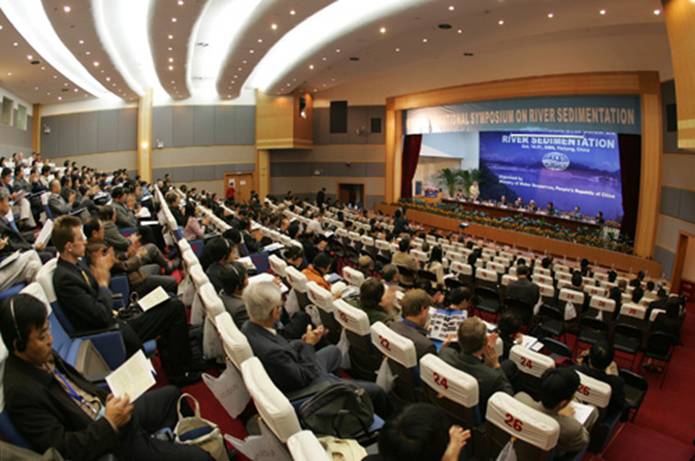
The 8th ISRS (Cairo, 2001)
The 8th ISRS was successfully held in Cairo, Egypt from 3 to 5 November 2001. It was organized by the National Water Research Center of Egypt under the auspices of Dr. M. Abu-Zeid, Minister of Water Resources and Irrigation, Egypt.
The Symposium theme is "Management of River Sedimentation". The main topics are as follows:
1. Flow in Alluvial Channels
2. Environmental Issues
3. River Protection and Development
4. Sediment Control Measures
5.Sediment Measurements
6.Modeling of Sediment Transport
207 researchers and engineers from ten countries namely, Austria, Belgium, China, Egypt, Italy, Japan, Jordan, Netherlands, Sudan and UK attended the symposium. 150 research papers were submitted to the scientific committee. However, only 50 papers were orally presented because of the mishap of Sept. 11th. Two keynote speeches were presented, the first was" Nile River Protection and Development- An Over View" by Dr. M. El. Moattassem, and the second "UNESCO Role in Sustainable
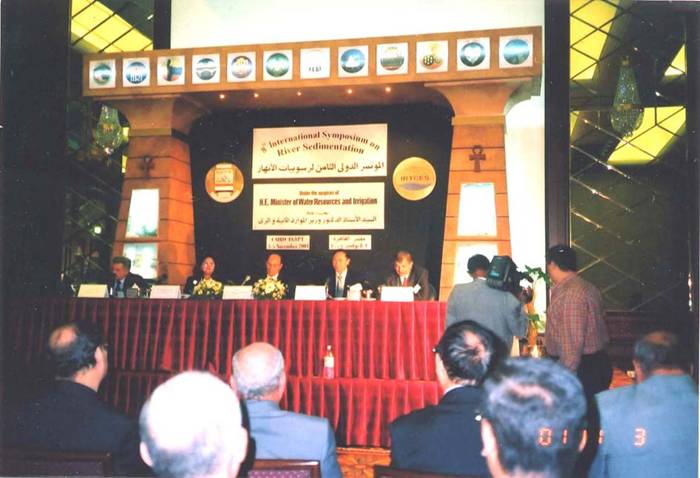
The 7th ISRS (Hong Kong, 1998)
The Seventh International Symposium on River Sedimentation (ISRS-98) was organized by the Department of Civil Engineering of the University of Hong Kong. It was jointly held in parallel with the Second International Symposium on Environmental Hydraulics (ISEC-98) at the Sheraton Hotel, Hong Kong, During December 16-18,1998.
The Proceedings of the Symposium contains 150 selected papers including contributions from 3 keynote speakers and 5 invited speakers, binging in expertise and experiences from 26 countries.
The main topics of the Symposium include:
1.Sedimentation Problems in River and Coastal System;
2.Environmental Hydraulics;
3.Sediment/ Environment Interaction.
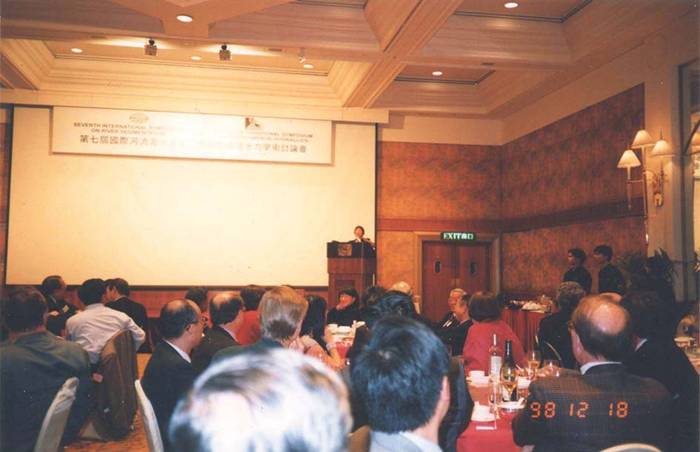
The 6th ISRS (New Delhi, 1995)
The sixth ISRS was held from 7 through 11, in New Delhi, India. Altogether about 150 engineers and scientists from 23 countries and areas attended this symposium.
The Symposium was hosted by the Central Board of Irrigation and Power, Government of India, and sponsored and co-sponsored by IRTCES, IAHR.
The Central theme of the Symposium was " Philosophy, aims and techniques of sediment management ".
The main topics are as follows:
1.Reservoir sediment management
2.River morphology
3.Modelling Methodologies
4.Hydraulic structures-scouring and deposition control
5.Environmental aspects of sediment management
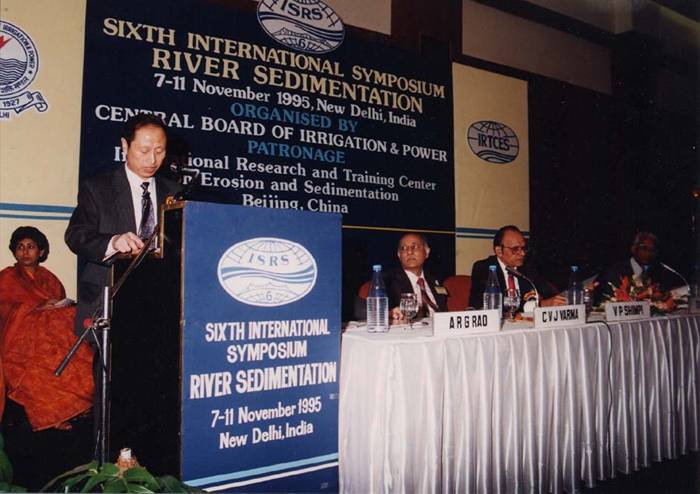
The 5th ISRS (Karlsruhe, 1992)
The 5th ISRS was held from April 6 through 10, 1992, at University of Karlsruhe, Germany. Altogether about 220 engineers and scientists from 38 countries and areas attended this symposium.
The Symposium was hosted by the Institute of Hydraulic Structures and Agricultural Engineering, University of Karlsruhe, and sponsored and co-sponsored by IRTCES, IAHR, UNESCO, Germany Research Foundation (DFG), Germany Association for Hydrology and Rural Engineering (DVWK), Federal Ministry of Transportation, Baden-Wurttemberg State Ministry for Science and Art, and Federal Hydraulic Laboratory (BAN).
The Central theme of the Symposium was "Sediment management". The main topics are as follows:
1. Sediment quality and its measurement
2. River morphology
3. Strongly graded bed materials and armoring
4. Hydraulic structures-scouring and deposition control
5. Sediment management in the reservoirs
6. Modeling methodologies
7. Environment aspects of sediment management
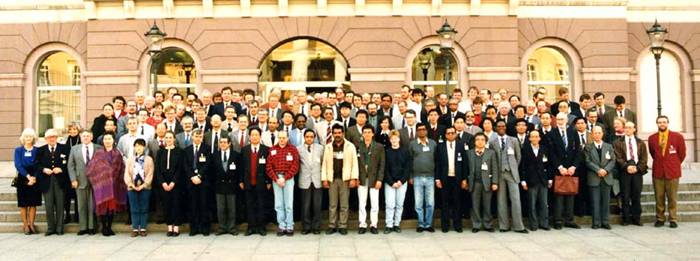
The 4th ISRS (Beijing, 1989)
The fourth ISRS was held in Beijing, China from 5 through 9, June 1989. It was jointly organized by the International Research and Training Centre on Erosion and Sedimentation (IRTCES), The Chinese Hydraulic Engineering Society (CHES), and the Chinese Society for Soil and Water Conservation (CSSWC), and co-sponsored by UNESCO, UNDP, IWRA, IAHR, IAHS, CACE and other Chinese relevant agencies.
A total of 285 participants attended the symposium. Among them 77 scholars came from 28 countries and regions. The preprinted proceedings in two volumes contained 202 selected papers of nine themes.
Overseas and Chinese scholars highly evaluated the success of the 4th ISRS. It strengthened friendship between scholars of various countries, promoted exchange of information and cooperation and proved to be beneficial to all the participants.
The central theme for the Fourth Symposium is "Effects of erosion control measures on sediment yield" which is of great importance in the management of watersheds and regulation of rivers. Hopefully this will help bridge the gap between soil conservation and fluvial hydraulics.
The central topics for the Symposium are as follows:
1.Process of soil erosion and simulation techniques
2. Small watershed management and its benefits
3. Mechanics of sediment transport
4. Fluvial processes
5. Aspects of sedimentation engineering
6. Environmental impacts of erosion and sedimentation
7. Simulation and measuring techniques of sedimentation
8. Socio-economic and institutional aspects of sedimentation.
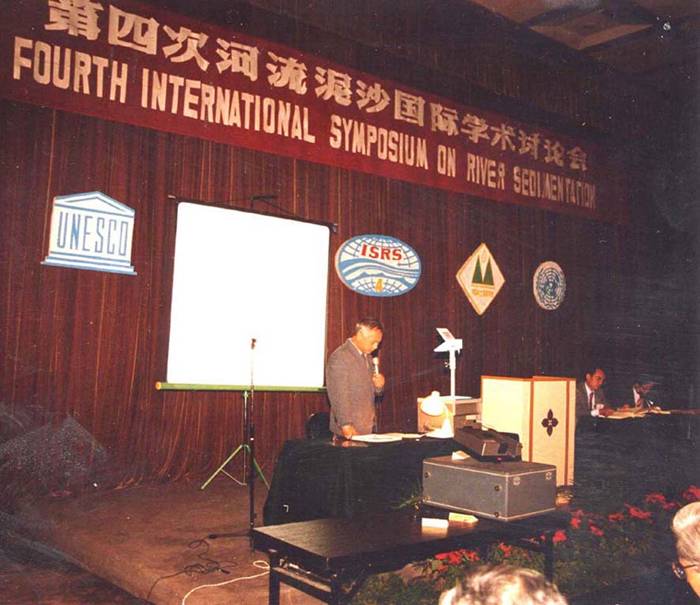
The 3rd ISRS(Jachson, 1986)
The third ISRS was held in the Ramda Renaissance Hotel in Jackson, Mississippi from March 31 to April 4, 1986. This symposium continues the successful First and Second Symposia held in Beijing, China in 1980 and Nanjing, China in 1983, respectively.
The principal sponsors are the Mississippi-Alabama Sea Grant Consortium, the United Nations Educational, Scientific and Cultural Organization and the University of Mississippi.
The objective of this series of symposia is to provide scholars, researchers and practitioners with a forum for reporting their latest findings of great importance, reviewing the current state-of the –art, determining the future direction of research, and exchanging ideas and experience in all areas of sedimentation research with emphasis on river sedimentation.
The central theme for the Third Symposium is Estuarine and Coastal Sedimentation because of its importance in the region coving the lower Mississippi River Valley and the coast of the Gulf of Mexico. As evidenced by the strong support of researchers around the world as well as national and international professional societies and governmental agencies, there is reason to expect that this series or symposia is to be developed into a major forum with the most comprehensive coverage in all areas of sedimentation research.
The central topics for the Symposium are as follows:
1.Sediment transport in rivers
2.Estuarine and coastal sedimentation
3.Hydraulics of sediment transport
4.Aspects of sedimentation engineering
5.Sediment yields and sources
6.Sedimentation processes in reservoirs and lakes
7.River and coastal hydrodynamics
8.Methodology in sedimentation research
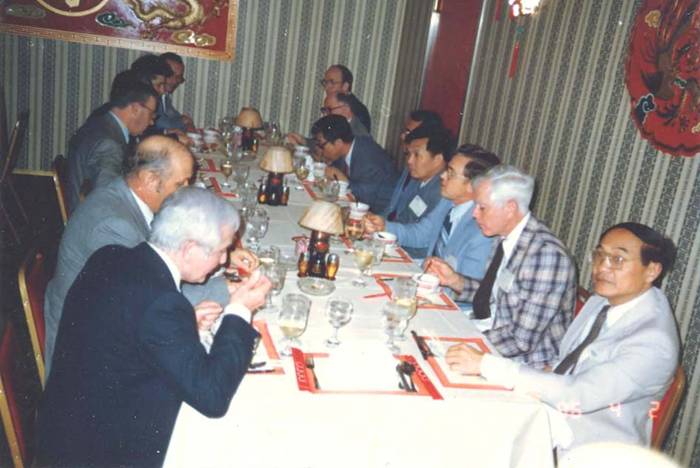
The 2nd ISRS (Nanjing, 1983)
The second ISRS was held in Nanjing, China, from Oct. 11 to 16, 1983, was another significant gathering of specialists in the field of river sedimentation. Authors presenting papers and participants from Asia, Africa, Europe, North America and Latin America total more than two hundred, including some one hundred from abroad. During he symposium, fellow river engineers, meeting together, reviewed new developments in the research of river sedimentation, exchanged the latest findings and discussed future research needs, thus strengthening the friendship and cooperation between scientists of various countries.
Presented in the symposium were 11 general reports and 108 papers covering five major themes in river sedimentation, which aroused immense interest of the participants and brought for the heated discussions.
The participants spoke highly of the convocation of international symposia on river sedimentation and expressed the hope of continuing the events of this kind. Many of them suggested and supported the establishment of Standing Secretariat of International Symposium on River Sedimentation in China, which will take charge of the preparation and arrangement of the future symposia.
This symposium, sponsored by the Chinese Society of Hydraulic Engineering and the Chinese National Committee of the IHP and supported by the UNESCO and the UNDP, ended successfully.
The main topics of the second ISRS are as follows:
1. Hydraulics of alluvial rivers
2. Sediment transportation in rivers
3. Fluvial processes
4. River training means
5. Model investigation and prototype measuring techniques of rivers
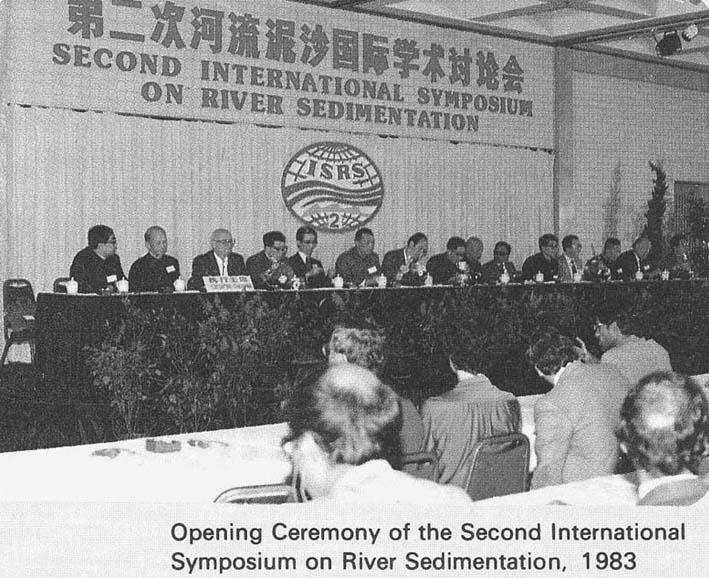
The 1st ISRS(Beijing, 1980)
The first ISRS held in Beijing from March 24 to 29, 1980 was the first international meeting organized by the Chinese Society of Hydraulic Engineering since the founding of New China. This Symposium was jointly sponsored by the Chinese Society of Hydraulic Engineering and the Chinese National Committee for the IHP and with the support of UNESCO.
The five main topics selected for this Symposium represent the five important phases of the river sedimentation problems including:
1.Sediment yield and utilization Sediment transport mechanics (including hyper-concentration transport)
2.Fluvial processes (including estuarine and coastal sedimentation)
3.Reservoir sedimentation
4.Laboratory and field measuring techniques an model tests of sediment transport.
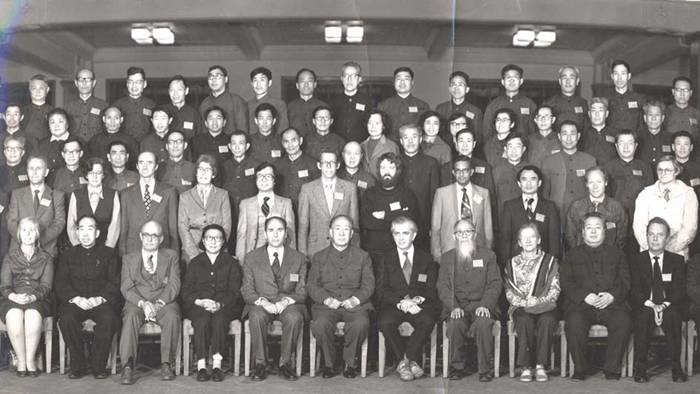
|
| |
| |
| |
| |
| |
|
| |

